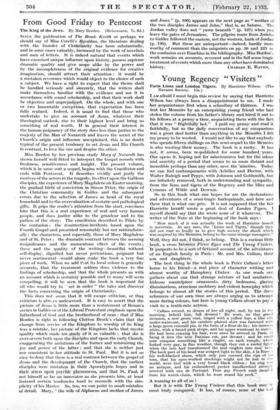From Good Friday to Pentecost
The King of the Jews. By Mary Borden. (Heinemann. 7s. 6d.) SINCE the publication of The Brook Kerith or perhaps we should say of Miss Corelli's .11grabbas, the literature dealing with the founder ,of Chriktianity has been substantially, and in some cases valuably, increased by the work of novelists and men of letters. It is indeed natural that events which have exercised unique influence Upon history, possess supreme dramatic quality and give scope alike, by the power and by the incompleteness of the original evidence for creative imagination, should attract their attention : it would be a mistaken reverence which would object to the choice of such a subject. We have a right to expect that the theme shall be handled 'seriously and sincerely, that the writers shall make themselves familiar with the evidence and use it in accordance with sound scholarship, and that their work shall be objective and unprejudiFed. On the whole, and with one or two lamentable exceptions, that expectation has been fully realized. Indeed, it is usual to find that those who undertake to give an acedunt of Jesus, whatever their theological outlook, rise to their highest level and bring us something of real worth. If in general their interest in the human poignancy of the story does less than justice to the• majesty of the Man of Nazareth and leaves the secret of the Church's origin and influence unexplained, this is no doubt typical of the present tendency to set Jesus and His Church in contrast, to love the one and despise the other.
Miss Borden by her previous study Mary of Nazareth has shown herself well fitted to interpret the Gospel records with freshness, sensitiveness and insight. The present volume, which is in some sort a sequel, begins with the Crucifixion and ends with Pentecost. It describes vividly and justly the motives of the actors in the tragedy, its effect upon the Galilean disciples, the experience of Mary Magdalene on Easter morning, the gradual birth of conviction in Simon Peter, the origin of the Christian community in Galilee and the subsequent errors due to the selection of James as head of the royal household and to the overvaluation of ecstatic and pathological gifts. It grips the reader's attention from the start, convinces him that this is a real experience of real and very human people, and does justice alike to the grandeur and to the pathos of the story. The crucifixion described to Pilate by the centurion ; the resurrection-incidents based upon the Fourth Gospel and presented reasonably but not rationalistic- ally; the characters, and especially those of Mary Magdalene and of St. Peter ; the dramatic contrast between the seeming insignificance and the momentous effect of the events';, these and the quality of the Writing—beautiful without self-display, dignified but never pretentious, poignant but never sentimental—would alone make the book a very fine piece of work. When we add Vint its local colour is generally accurate, that the treatment seldom does violence to the findings of scholarship, and -that the whole presents us with an account which is certainly possible and to many will seem compelling, it will be seen that the book is important for all who would try to set in order" the tales and discover the facts concerning the origin of Christianity.
This does not oean that it will escape criticism, or that criticism is alwr,ys undeserved. It is easy to assert that the picture of Jesus is little more than a restatement of Renan's scenes in Galilee or of the Liberal Protestant emphasis upon the fatherhood of God and the brotherhood of man ; that if Miss Borden is right in following Clutton Brock's -claim that the change frOm service of the Kingdom to worship of its King was a mistake, her picture of the Kingdom lacks that mystic quality Which made his -studirlsof it so valuable; that she is over-severe both upon the disciples and upon the early Church, exaggerating the ambitions of the former and minimizing the joy and power of the latter ; and that the is neither just nor consistent in her attitude to $t. Paul. But it is not so easy to deny that there is a real contrast between the gospel of Jesus and the development of:the Church, that the earliest disciples were mistaken rn their Apocalyptic hopes and in their stress upon psychic phenomena, and that St. Paul, if not himself so far an innovator: as she presents him, at least fostered certain tendencies hard to reconcile with the sim- plicity of his Master. So, too, we can point to small mistakes of detail. Mary, "the wife of Alphaeus and mother of James and Joses " (p. 100) appears on the next page as "mother of the two disciples James and John," that is, as Salome. The Jordan valley does not "yawn beneath" (p. 127) when you leave the gates of Jerusalem. The pilgrim route from Jericho to Galilee followed the eastern, not the western, bank of Jordan (p. 190). But :these are unithportant—indeed, hardly more worthy of comment than the misprints on pp. 50 and 225 or the confusion over Eusebins in the bibliography. Miss Borden's work remains an accurate, reverent and in the full sense tragic treatment of events which more than any other have dominated


















































 Previous page
Previous page